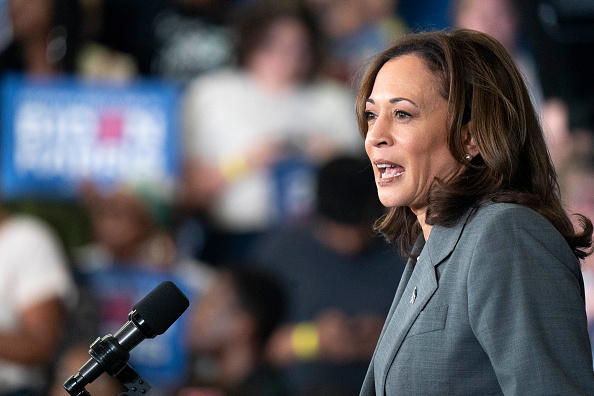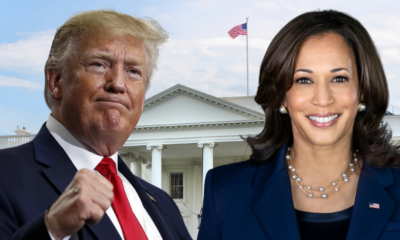Politics
Kamala Harris at the DNC: A Defining Moment for the 2024 Election and Beyond
Published
10 months agoon

On August 22, 2024, Vice President Kamala Harris delivered a significant speech at the Democratic National Convention (DNC) in Chicago, setting the tone for the upcoming 2024 presidential election. As the first woman of color to be nominated for the presidency by a major political party, Harris’s speech was a landmark moment, emphasizing her vision for the nation, her critique of former President Donald Trump’s policies, and her call for unity and progress. The speech not only resonated with the Democratic base but also positioned Harris as a key figure in what is expected to be one of the most consequential elections in recent American history.
Context: The Political Landscape Leading Up to the DNC
The 2024 election cycle is unfolding in a deeply polarized environment. The country remains divided on various critical issues, including abortion rights, immigration, healthcare, and the economy. The aftermath of the 2020 election, marked by former President Donald Trump’s challenges to the election results and ongoing legal battles, continues to shape the political discourse. These events have heightened the stakes of the 2024 election, which many see as a critical juncture for the future of American democracy.
Kamala Harris’s emergence as the Democratic Party’s presidential nominee follows President Joe Biden’s decision not to seek re-election, citing concerns related to age and a desire to pass the torch to the next generation of leaders. Harris’s nomination is historically significant, not only because of her race and gender but also because it reflects the Democratic Party’s broader commitment to diversity and inclusion. Her candidacy is seen as both a continuation of her long career in public service and a new chapter in American political leadership.
The Speech: A Call for Unity and Addressing Trump’s Legacy
In her acceptance speech at the DNC, Kamala Harris made a strong appeal for national unity, urging Americans to come together to address the country’s challenges. She emphasized that the divisions within the nation are not just political but moral, calling for a collective effort to build a more equitable and just society.
A significant portion of Harris’s speech focused on addressing the legacy of Donald Trump’s presidency. Without naming him directly, Harris criticized the former president’s policies and actions, particularly his response to the COVID-19 pandemic, efforts to undermine the 2020 election, and environmental policy rollbacks. Harris framed these issues as critical threats to democracy and positioned herself as a candidate who could restore trust and integrity to the presidency.
Harris’s Vision: A Progressive Agenda
Harris’s speech also outlined her vision for the future, which includes a progressive agenda aimed at addressing key issues such as healthcare, climate change, and racial justice. She emphasized the importance of expanding access to healthcare, particularly in the context of lessons learned from the COVID-19 pandemic, and reaffirmed her commitment to protecting the Affordable Care Act.
Climate change was another major focus of Harris’s speech. She pledged to take decisive action to address the climate crisis, including rejoining international agreements like the Paris Accord, investing in renewable energy, and implementing policies to reduce carbon emissions. Harris argued that these actions are not only necessary for environmental protection but also represent significant economic opportunities, particularly in the creation of new jobs in green industries.
On the issue of racial justice, Harris drew from her own experiences as a woman of color, highlighting the need for systemic reform in areas such as criminal justice and economic inequality. She called for ending private prisons, abolishing cash bail, and addressing police misconduct, alongside investments in education, housing, and job opportunities for marginalized communities.
The Historical Significance of Harris’s Nomination
Kamala Harris’s nomination as the Democratic candidate for president is a momentous event in American political history. It underscores the evolving landscape of political representation in the United States, where diversity and inclusion have become increasingly central to the Democratic Party’s identity. Harris’s candidacy, as a woman of African American and South Asian descent, is particularly significant in a nation where such representation at the highest levels of government has been historically limited.
Harris’s nomination also continues the legacy of women who have broken barriers in American politics. Figures like Shirley Chisholm, the first Black woman to run for president, and Hillary Clinton, the first woman to receive a major party’s presidential nomination, have paved the way for Harris’s candidacy. Her nomination is seen by many as a step forward in the ongoing struggle for gender equality in politics.
The Reaction: A Mixed Response
The reaction to Kamala Harris’s speech at the DNC has been varied, reflecting the deep divisions within American politics. Among Democrats and progressives, the speech was generally well-received, with many praising Harris’s emphasis on unity and her commitment to addressing the country’s most pressing challenges. For many supporters, the speech reinforced Harris’s position as a strong and capable leader, capable of guiding the nation through its current crises.
However, the response from Republicans and conservatives was more critical. Some accused Harris of being overly partisan, particularly in her critiques of Trump-era policies. Critics argued that Harris’s progressive platform might be too far-reaching for a significant portion of the electorate, potentially alienating moderate voters. Additionally, some conservative commentators and politicians warned that Harris’s policies could lead to increased government intervention in areas such as healthcare and the economy, raising concerns about higher taxes and regulation.
Despite these differing perspectives, Harris’s speech undeniably set the stage for the 2024 election, framing the contest as a choice between two very different visions for the country’s future.
The Path Forward: Challenges and Opportunities
As Kamala Harris moves forward in her campaign, she faces both significant challenges and opportunities. One of her primary challenges will be uniting the diverse coalition of voters within the Democratic Party, which includes progressives, moderates, and independents. While her progressive platform has energized certain segments of the electorate, Harris will need to ensure that her message appeals to a broader audience, particularly in key battleground states that will be crucial to her electoral success.
Additionally, Harris’s candidacy brings to the forefront the complexities of gender and race in American politics. As a woman of color, she may face heightened scrutiny and biases, which could influence public perception and media coverage of her campaign. Navigating these dynamics will require a careful and strategic approach, with a focus on highlighting her qualifications and policy positions.
On the other hand, Harris’s candidacy also presents unique opportunities. Her potential to mobilize voters who have historically been underrepresented in the political process—such as young voters, women, and people of color; could be a decisive factor in the election. By addressing issues such as climate change, healthcare, and social justice, Harris may be able to galvanize these groups and expand the Democratic Party’s base.
Conclusion: A Defining Moment in American Politics
Kamala Harris’s acceptance speech at the 2024 Democratic National Convention marks a defining moment in American politics, setting the stage for what is likely to be a highly contested and closely watched presidential election. Harris’s speech emphasized her vision for a more just and inclusive America, her commitment to unity, and her determination to address the challenges facing the nation.
As the first woman of color to be nominated for the presidency by a major political party, Harris’s candidacy is a historic milestone that reflects broader changes in American society and politics. However, her campaign will also have to contend with significant challenges, including a deeply polarized electorate and the complexities of race and gender in political life.
In the months ahead, Harris will need to continue articulating her vision for the country and building a coalition of voters that can carry her to victory. If successful, she could make history as the first female president of the United States, ushering in a new era of leadership and progress.
Photo Credit: Gettyimages.
You may like
-


Concerns Rise Over Republican Poll Watchers in Battleground States
-


Election Live Updates: Harris to Rally in Atlanta as Trump Heads to Arizona
-


Chinese Influence Operation Targets U.S. Down-Ballot Races, Microsoft Reports
-


Tragedy Strikes as Five Lives Are Lost in Washington Shooting
-


Trump vs. Harris: Scenes from the Campaign Trail
-


Harris and Trump to Face Voters at Town Halls
-


Cuba Faces Nationwide Power Grid Collapse Amidst Ongoing Crisis
-


What Is The Current Us Elections Rating And Who Is Leading The Polls?
-


Safe Travel in Mexico: Tips for a Hassle-Free Trip
-


See Rome on a Budget: History and Culture Without the Cost

Unfiltered: Behind the Headlines with Page Six

Unlock Your Financial Potential with SoFi High-Yield Savings

Unlocking the ASUS Student Discount on Reddit: A Comprehensive Guide

How to Lose Weight Fast: The Best Drink Recipes for Rapid Results

Clinical Trials Market Set for Robust Growth, Driven by Drug Development Surge and Digital Innovation

Pediatric Vaccines Market: Safeguarding Futures, Driving Growth

Faropenem Sodium Market: A Potent Weapon in the Fight Against Bacterial Infections

Downhole Tools Market: Navigating Subsurface Frontiers with Precision

Waterproof Structural Adhesives Market: A Comprehensive Study Towards USD 10.3 Billion in 2035

Preventive Vaccines Market to Witness Strong Growth by 2035

Industrial Boiler Market Expected to Surpass USD 24.4 Billion by 2035 Amid Growing Demand for Energy Efficiency and Industrialization

Fill-Finish Pharmaceutical Contract Manufacturing Market Expected to Flourish Amid Biopharmaceutical Boom and Global Outsourcing Trend by 2035

Pet Food Nutraceutical Market Set for Robust Expansion Amid Rising Demand for Pet Wellness by 2035

Green Bio Chemicals Market Poised for Sustainable Growth amidst Global Shift to Eco-Friendly Alternatives by 2035

Cat Food Market Forecast 2035: Natural Ingredients, Pet Wellness to Lead the Way
Trending News
-

 Food8 hours ago
Food8 hours agoHow to Lose Weight Fast: The Best Drink Recipes for Rapid Results
-

 Education8 hours ago
Education8 hours agoUnlocking the ASUS Student Discount on Reddit: A Comprehensive Guide
-

 Banking5 hours ago
Banking5 hours agoUnlock Your Financial Potential with SoFi High-Yield Savings
-

 News38 minutes ago
News38 minutes agoUnfiltered: Behind the Headlines with Page Six



